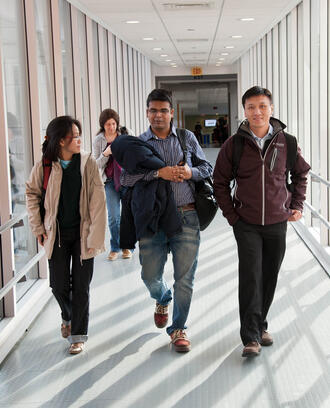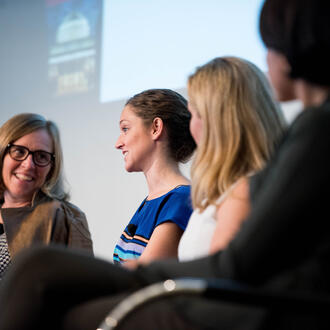Entrepreneurship
Into the lion's den: alumni entrepreneurs helping the next generation
No doubt about it. Bettina Hein, SF '08, and Andreas Goeldi, SF '08, are a dynamic duo. Married with two children, she is German, he is Swiss. What has put them in neon on the global map is their entrepreneurial prowess. Hein and Goeldi are two of the most successful and prolific entrepreneurs to graduate from the MIT Sloan Fellows Program—not a trifling distinction.
Hein’s portfolio includes the digital marketing firm Pixability, which she launched during her time as an MIT Sloan Fellow. Goeldi kicked off his entrepreneurial career with Namics, one of the first online professional services companies in the world. Both sold their businesses for eye-popping sums and embarked on a string of other entrepreneurial adventures.
Bettina Hein, SF '08
Fast forward. Hein just launched the digital health company Juli, and she is a judge on the popular Swiss pitch show “The Lion’s Den” (“Shark Tank” with a European sensibility), where she also is invested in promoting young innovators. Goeldi is now working as a venture capitalist nurturing young entrepreneurs, especially those outside tried and true new-enterprise ecosystems. We sat down with them to find out what they’re up to today.
You two were a legendary power couple in your time as MIT Sloan Fellows…and even more so now. How did you meet?
Hein: We met at St. Gallen University. Andreas was a teaching assistant two years ahead of me in the computer science department. To be honest, I kind of dismissed him as the shy guy in the corner. But a couple of years later, when I was the student government president, I asked him to give a talk on how to handle the IT end of a master’s thesis. He delivered the most fabulous presentation I’d ever heard. I was totally taken aback.
Goeldi: Yes (laughing), that’s pretty much how it went down.
Were you entrepreneurial from birth, born to launch enterprises?
Goeldi: My grandfather was a factory owner. He was killed in WWII, but by the time he died, he’d established a culture of entrepreneurial thinking in our family. My dad led the economic development agency in our Swiss canton and took me to different cities to talk to entrepreneurs—amazing people doing amazing things. As a kid I started my own school newspaper and invented and tried to market my own video games—not very successfully, as it turned out—but it was a learning experience.
Hein: All four of my grandparents were entrepreneurs. My paternal grandmother had her own pharmacy. My maternal grandmother owned and operated a corner store, which had been her dream. One grandfather was in coal, the other was a chemist-inventor who invented alcopop drinks. Still, I didn’t have the guts to start a business straight out of college. It was Andreas who encouraged me.
What was your first entrepreneurial success?
Hein: By way of warm-up, I founded START in grad school, a program supporting college students interested in starting businesses. Shortly afterward, I raised eight million dollars to cofound SVOX, a tech company spun off from the Swiss Federal Institute of Technology. It made software for speech recognition and text-to-speech and was later acquired by Nuance for $125 million.
Andreas Goeldi, SF '08
Goeldi: At university, I was a computer science researcher in a team that was harnessing this new thing called the internet. Right out of school, I started Namics with two friends. We built an online banking system for our first customer Credit Suisse, and from there, the company skyrocketed. In early 2000, we sold a majority of the firm, but stayed on after the acquisition and weathered the market crash. When the company was acquired by a behemoth, I did a quick stint with the new parent company, then realized that corporate life was not for me.
Which brings us to your sabbatical in the MIT Sloan Fellows Program.
Goeldi: So, it’s 2005, and I feel like I need to do something new. Bettina and I, now married, applied to MIT. They accepted us both. I entered the program with the intention of figuring out what I wanted to do next. MIT is absolutely the best place to find out where technology is headed. The top people in my field are here, and I had the chance to work with them. I met Tim Jones, also a Sloan Fellow, and we built a new company focused on social media and analytics, but when Bettina launched the digital marketing firm Pixability, I decided to join her as CTO.
Hein: Yes, we came to MIT for the same reasons. It was a great opportunity to be exposed to Boston entrepreneurs and get to know our way around the entrepreneurial ecosystem in the U.S., which is on a different plane from anywhere else in the world. If you want to be a successful entrepreneur, it pays to observe how it’s done here. After my time as a Sloan Fellow I founded Pixability, and Andreas and I decided to band together to make it work. By 2016, it was the fastest growing startup company in Massachusetts with almost $30 million in venture capital.
Do you think your year as an MIT Sloan Fellow served you well?
Goeldi: I have incorporated so much knowledge, so many tools from the MIT Sloan Fellows Program into my work. I feel like I’m always drawing from that bottomless well.
Hein: Me too, and oh, the network! I speak regularly to brilliant classmates, like Jennifer Fremont-Smith, and to faculty rock stars like Ed Roberts.
What magic are you cooking up now?
Hein: During the pandemic, I founded a digital health company called Juli. It helps people manage their chronic conditions. I was able to build a dream team—all remote—spanning 13 time zones. Keeping the company virtual makes it easier to recruit talent from all over the world.
Goeldi: And I moved over to the venture capital side of things—a very intentional decision. As an investor, I wanted to be able to dedicate my time to helping very young companies with diverse CEOs. It’s a deeply satisfying thing to do.
What’s it like to be husband and wife entrepreneurs?
Hein: Interesting, in that it has illuminated the inherent bias that exists when it comes to women entrepreneurs. What a woman says is often questioned. Double standards abound. There have been so many instances in the board room where I outline a strategy and the men around the table don’t have confidence in it or me. Even though I have a track record of raising extraordinary sums of money—probably more than the men I’m pitching to—when I speak, the investors balk. Then Andreas will chime in and say the very same thing, and they will say, “Ok, now that is brilliant.”
Goeldi: And I will point out that the woman before me just said the same thing, but it doesn’t seem to make a difference.
Hein: Andreas knows firsthand how hard it is for a female CEO to do her job in tech, so he’s trying to right that wrong now that’s he’s on the investor side.
Goeldi: Yes, I’m doing everything I can to advance change on that score.
Hein: And I founded SHE-E-OS, a networking group for female founders, to prepare a new generation of executives for the challenges they might not realize they will face. Andreas and I want to move the roadblocks out of the way so that a diverse new generation of entrepreneurs can succeed on their merits without prejudice.



